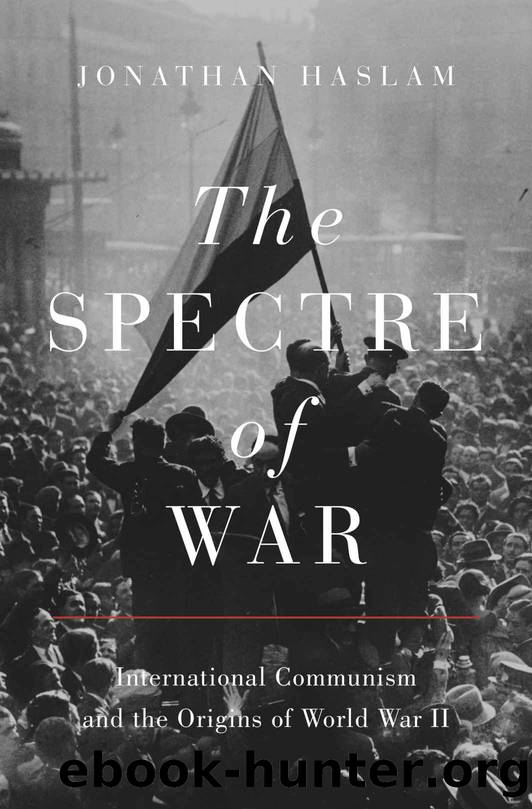The Spectre of War: International Communism and the Origins of World War II by Jonathan Haslam

Author:Jonathan Haslam [Haslam, Jonathan]
Language: eng
Format: epub
ISBN: 9780691182650
Google: xZIIEAAAQBAJ
Amazon: 0691182655
Published: 2021-05-25T00:00:00+00:00
The Marco Polo Bridge Incident: War
Unlike in the Manchurian crisis of 1931, the shooting incident that occurred on 8 July 1937 on Marco Polo Bridge (Lukouchiao) ten miles west of Beijing and gave rise to fighting between Chinese and Japanese troops is believed to have been spontaneous. The American naval attaché in Tokyo, however, reported, âMany circumstances point to the fact that the present trouble in North China was either instigated by the Japanese or that they are using the incidents to further their aims and ambitions in that area.â16 Certainly the Japanese reacted aggressively after the incident by launching a major campaign from their base in occupied Manchuria to conquer the whole of northern Chinaâunder General Doihara, the provinces of Jehol, Hopei and Chahar had already been incorporated into a buffer zone through a blend of terror and cajolery. Even before the âincidentâ, General Isogai, chief of the military affairs bureau of the Japanese War Ministry, had warned the British that âJapan was not antagonistic towards the Nanking [Nanjing] government but was sceptical over its real attitude towards the suppression of communismâ. More specifically, â[w]hile the Nanking governmentâs attitude with regard to the special relations between Japan, Manchukuo and north China, to the control of anti-Japanese activities and the suppression of communism remained unsatisfactory, the Japanese government could not remain indifferent.â17
The inflation of nomenclature tells all. âIncidentâ in Japanese is jihen, which means a conflict short of war. At the outset the Japanese called the shooting at Marco Polo Bridge the âLukouchiao Incidentâ. This was subsequently and tellingly renamed the âNorth China Incidentâ; then the âSinoâJapanese Incidentâ; and, finally, the âChina Incidentâ, as the Japanese relentlessly expanded their military offensive and took advantage of events.18 Indeed, on 17 August the Japanese cabinet accepted that this was a war in all but name and reversed the policy of not extending the conflict.19 Hitherto Japanese aggression could be seen as âlocalâ. But this now turned out to be something entirely different in scale. The first question was how the Chinese would react. The second question was how the British and the Americans would respond.
Download
This site does not store any files on its server. We only index and link to content provided by other sites. Please contact the content providers to delete copyright contents if any and email us, we'll remove relevant links or contents immediately.
| Africa | Americas |
| Arctic & Antarctica | Asia |
| Australia & Oceania | Europe |
| Middle East | Russia |
| United States | World |
| Ancient Civilizations | Military |
| Historical Study & Educational Resources |
Never by Ken Follett(2924)
Machine Learning at Scale with H2O by Gregory Keys | David Whiting(2335)
The Man Who Died Twice by Richard Osman(2318)
Fairy Tale by Stephen King(2107)
Will by Will Smith(2085)
Rationality by Steven Pinker(1783)
The Dark Hours by Michael Connelly(1590)
The Dawn of Everything: A New History of Humanity by David Graeber & David Wengrow(1584)
Principles for Dealing With the Changing World Order: Why Nations Succeed and Fail by Ray Dalio(1393)
Friends, Lovers, and the Big Terrible Thing by Matthew Perry(1356)
A Short History of War by Jeremy Black(1313)
HBR's 10 Must Reads 2022 by Harvard Business Review(1267)
Go Tell the Bees That I Am Gone by Diana Gabaldon(1255)
Can't Hurt Me: Master Your Mind and Defy the Odds - Clean Edition by David Goggins(1247)
515945210 by Unknown(1221)
Fear No Evil by James Patterson(1124)
443319537 by Unknown(1084)
Works by Richard Wright(1027)
Going There by Katie Couric(1001)
